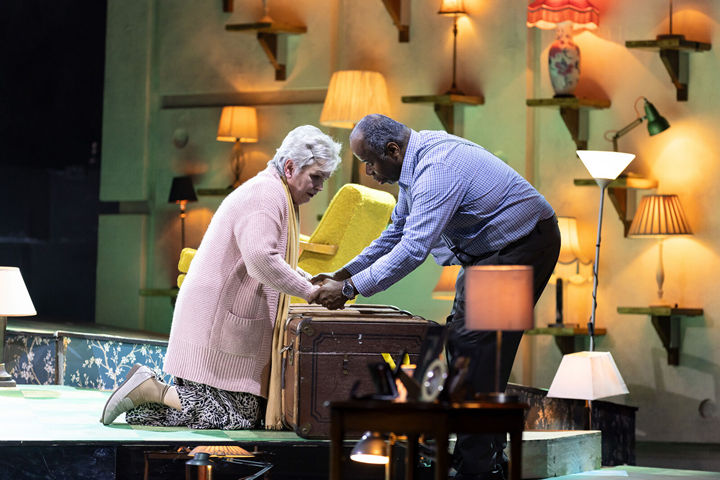| Opera Reviews | 3 May 2024 |
A life-affirming production of Bartók's dark operaby Catriona Graham |
|
Bartók: Bluebeard's Castle |
|
 |
|
|
Europe is aging. A fifth of the population is over 65 and half is over 45, so the arts, if they are to remain relevant, must reflect that fact. There are many ways to do it, and Theatre of Sound’s production of Bluebeard’s Castle, at the Edinburgh International Festival vividly shows one way. Béla Bartók’s short opera is generally regarded as dark, psychological, disturbing. Director and librettist Daisy Evans has made it, if not heart-warming, at least life-affirming. Adrian Linford’s set has three or four slightly slanting levels, with only a low step between the different levels. There is an armchair at the back, a trunk almost centre stage, a table with photos stage left front, and another table or desk half in shadow, as if in the hall. Behind, a wall has lots of small, pedestal shelves with table-lamps. There are table lamps everywhere. Jake Wiltshire’s lighting creates a space that is bright and dim at the same time. It starts with Bluebeard coming on stage, flicking through a photograph album and singing quietly to himself. He is elderly, but spry. Then he goes out and comes back with Judith, a white-haired woman, wearing an outdoor coat and a vacant expression. Bluebeard welcomes her, coaxes her out of her coat. It is clear by now that Judith has dementia and Bluebeard is her loving husband. Lester Lynch is superb as Bluebeard. His anguish at his wife’s illness, the pain of his inability to help her is both acted out and shines through his singing. Though he tries to calm and reassure his wife, she is adamant. She has decided that she wants to look inside the locked doors of the trunk and nothing that her husband can say will dissuade her. Susan Bullock’s performance is outstanding. Her bewildered, vacant expression, her gestures, her incomprehension, all will be recognisable to anyone with experience of the illness in family or friends. Her insistence on opening the doors upsets her husband but, to calm her, he complies. Each ‘door’ unlocks a memory. The first, a silky kimono, brings back memories of their early romance; Bluebeard’s eyes light up at the memory too. It is impersonated by a young woman. Then there is his old army coat – he finds a photo of her in the pocket. The third memory is of her as a bride, in a golden frock and veil, with a bouquet of sunflowers; she is his treasure. Then there are baby bootees, which conjure up Christmas with the children, followed by the loss, by drowning, of their son. Judith’s insistence on the stillness of the water conjures very potently the immediacy of her grief. Bluebeard’s own grief is visible, but unvoiced. Finally, she is obsessed with the other women he has loved, and he reveals that they were all her, but she turns away. Disbelieving, or sinking further into dementia? His pain as he leaves her hurts. Stephen Higgins conducts the Hebrides Ensemble onstage in his chamber arrangement of the orchestral score. It works well, both echoing and creating the intimacy of the staging as scenes from a long marriage. |
|
Photo © Jess Shurte |
|







